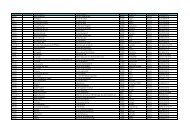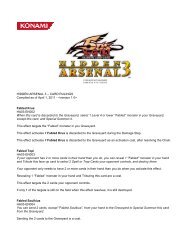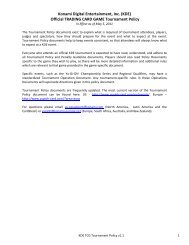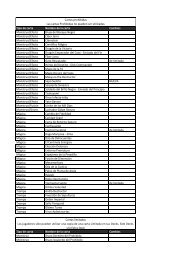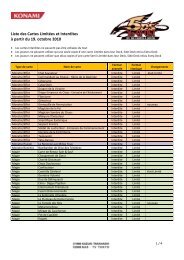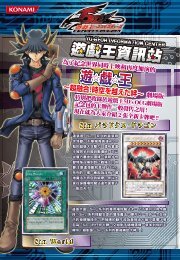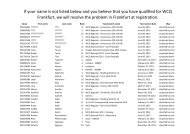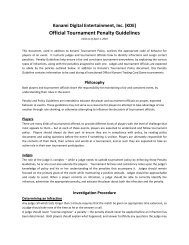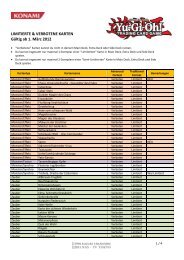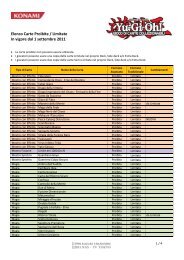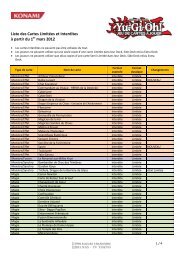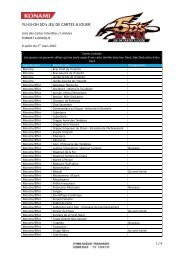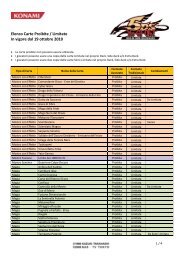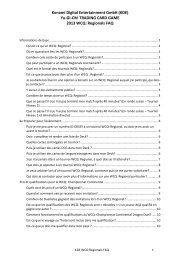KDE TCG Tournament Policy v1.1 - Yu-Gi-Oh!
KDE TCG Tournament Policy v1.1 - Yu-Gi-Oh!
KDE TCG Tournament Policy v1.1 - Yu-Gi-Oh!
Create successful ePaper yourself
Turn your PDF publications into a flip-book with our unique Google optimized e-Paper software.
Konami Digital Entertainment, Inc. (<strong>KDE</strong>)<br />
Official TRADING CARD GAME <strong>Tournament</strong> <strong>Policy</strong><br />
In Effect as of May 5, 2011<br />
The <strong>Tournament</strong> <strong>Policy</strong> documents exist to explain what is required of tournament attendees, players,<br />
judges and spectators; how they should prepare for the event and what to expect at the event.<br />
<strong>Tournament</strong> <strong>Policy</strong> documents help to keep events consistent, so that attendees will always know what<br />
to expect at a <strong>KDE</strong> event.<br />
Everyone who attends an official <strong>KDE</strong> tournament is expected to have read, understood, and adhere to<br />
all <strong>Tournament</strong> <strong>Policy</strong> and Penalty Guideline documents. Players should also read <strong>Policy</strong> Documents<br />
specific to the game they wish to play, as there will be more detailed information and additional rules<br />
which are relevant to that game provided in the game-specific document.<br />
Specific events, such as the <strong>Yu</strong>-<strong>Gi</strong>-<strong>Oh</strong>! Championship Series and Regional Qualifiers, may have a<br />
standardized <strong>Tournament</strong> Operation Document. Any tournament-specific rules in these Operations<br />
Documents will supersede directions given in this policy document.<br />
<strong>Tournament</strong> <strong>Policy</strong> documents are frequently updated. The most current version of the <strong>Tournament</strong><br />
<strong>Policy</strong> document can be found here: US - http://www.yugioh-card.com/en/events/, Europe –<br />
http://www.yugioh-card.com/?area=eurp<br />
For questions please email us-opsupport@konami.com (North America, Latin America and the<br />
Caribbean) or yugioh@konami-europe.net (Europe, South Africa, Australia, and New Zealand).<br />
<strong>KDE</strong> <strong>TCG</strong> <strong>Tournament</strong> <strong>Policy</strong> <strong>v1.1</strong> 1
I. Preparing To Play<br />
A. Players<br />
B. Ineligible Players<br />
C. Head Judge<br />
D. Floor Judge<br />
E. <strong>Tournament</strong> Organizer<br />
F. Scorekeeper<br />
G. Spectators<br />
H. Media<br />
II. Player Responsibilities<br />
A. Player ID/COSSY ID Number<br />
B. Identification<br />
C. <strong>Tournament</strong> Materials<br />
D. Understand Rulings<br />
E. Unacceptable Behavior<br />
F. Communication<br />
III. <strong>Tournament</strong> Information<br />
A. <strong>Tournament</strong> Tiers<br />
B. Sanctioning<br />
C. <strong>Tournament</strong> Match Structure<br />
D. Number of Rounds<br />
E. Publishing <strong>Tournament</strong> Information<br />
F. Reporting<br />
IV. <strong>Tournament</strong> Rules<br />
A. Sportsmanship<br />
B. Bribery & Collusion<br />
C. Random Outcome<br />
D. Tiebreakers<br />
E. Note Taking<br />
F. Game State<br />
G. Sleeves<br />
H. Shuffling<br />
I. Marked Cards<br />
J. Proxy Cards<br />
K. Concessions<br />
V. <strong>Tournament</strong> Infractions<br />
A. Slow Play<br />
B. Wagering<br />
C. Cheating<br />
D. Unsporting Conduct<br />
E. Buying and Selling Cards<br />
F. Prohibited Items<br />
G. Privileged Information<br />
H. Impersonation of <strong>KDE</strong> Employees or Representatives<br />
I. Suspension<br />
<strong>KDE</strong> <strong>TCG</strong> <strong>Tournament</strong> <strong>Policy</strong> <strong>v1.1</strong> 2
A. Players<br />
I. Preparing To Play<br />
To participate in a sanctioned <strong>KDE</strong> tournament you need a Konami Player ID card with a COSSY barcode<br />
and number. If you do not have one, you may sign up for one at the event. Do not lose your ID card, as it<br />
cannot be replaced. Please note that players at sanctioned <strong>KDE</strong> tournaments will be referred to by their<br />
Konami Player ID number and their first name and last name.<br />
You must be in good standing and not on the suspended list to participate in Konami sanctioned events.<br />
To remain in good standing, you must adhere to all player responsibilities outlined in this and other<br />
official documents. You must meet any age and/or invitation requirements that apply to selected<br />
tournaments. (e.g. Dragon Duel events or National Championships).<br />
B. Ineligible Players<br />
Any tournament official associated with or working an event cannot play in that specific event. This<br />
includes, but is not limited to, the Judge Staff, Scorekeeper, and <strong>Tournament</strong> Organizer.<br />
Individuals who have been suspended from Official Konami <strong>Tournament</strong>s may not play in sanctioned<br />
events. In addition, suspended individuals are prohibited from entering tournament venues. A list of<br />
suspended players can be located here http://www.yugioh-card.com/en/events/<br />
Individuals who are banned by the rules of the <strong>Tournament</strong> Organizer, venue, or by local law cannot<br />
participate in official events.<br />
Employees of Konami Corporation and their immediate family members (i.e. children, parents, and<br />
spouses) cannot play in official events. There may be exceptions made to this rule, in the case of Bounty<br />
tournaments or other special events, which will be announced beforehand.<br />
Employees of partner companies cannot play in official events. These include, but are not limited to, VIZ<br />
Media, LLC., 4Kids Entertainment, Inc.<br />
Employees of partner companies responsible for Organized Play (e.g. Devir, Amigo Spiel & Freizeit, etc.)<br />
cannot play in official events taking place in the market they are responsible for. They may, however,<br />
participate in events taking place outside of their market.<br />
C. Head Judge<br />
The Head Judge makes the final call for rulings or policy appeals. He or she requires superior knowledge<br />
of rulings and penalty guidelines. No other individual, including the tournament organizer or a Konami<br />
employee can overturn a call made by the Head Judge.<br />
The Head Judge must be physically present and available during the tournament, to deal with event<br />
issues and answer appeals promptly. The Head Judge must be adequately prepared to make sure that<br />
proper guidelines are followed.<br />
The Head Judge should act as a mentor for the event’s staff, and should carefully consider individual<br />
judges’ strengths and weaknesses when building the staff list and assembling teams. Judges should also<br />
receive feedback and evaluation from the Head Judge, consisting of compliments on their strengths and<br />
suggestions on how to improve further.<br />
<strong>KDE</strong> <strong>TCG</strong> <strong>Tournament</strong> <strong>Policy</strong> <strong>v1.1</strong> 3
The Head Judge is responsible for communicating accurate information throughout the tournament to<br />
both players and event staff.<br />
D. Floor Judge<br />
Judges are expected to be courteous, professional, and on-task while staffing an event. While judging,<br />
judges should not engage in trading, long personal conversations, phone calls or other activities that<br />
would distract them from the tournament. Judges may not wear their judge shirt when they are not<br />
judging an event.<br />
Judges should respect the authority of their Head Judge and team lead, and must address other<br />
members of the tournament staff with respect. Judges must interact with players in a polite manner,<br />
and do so without compromising his or her authority.<br />
Judges are required to adhere to the specific responsibilities assigned to them both on the floor and as<br />
members of a specialized unit such as a Deck check or pairings team. In addition, they must be prepared<br />
to assist other judges in tasks as they are assigned.<br />
Judges should constantly observe players, and maintain the tournament area by removing trash,<br />
pushing in chairs and straightening tables. Judges should actively walk the tournament floor and observe<br />
the matches, rather than waiting for a player to call for a judge.<br />
When a player calls for a judge, the judge should approach the table, listen to the question, and provide<br />
a decision. If either player wishes to appeal the decision, the judge should notify the Head Judge<br />
immediately.<br />
Judges are expected to seek out and complete certification tests to match their level of skill to the best<br />
of their ability, and should stay current with new rulings and new cards as they are released. Judges are<br />
also responsible for knowing the policy and guidelines documents for the games they wish to judge, and<br />
must keep themselves informed and well-versed in new documents as they are made available. Judges<br />
should actively seek out additional training, and are encouraged to assist their fellow judges in doing the<br />
same.<br />
Apart from answering judge calls, judges should refrain from conversing with players engaged in a<br />
match, to avoid creating the impression of favoritism. This especially applies to conversations held in a<br />
language the opponent doesn’t understand.<br />
E. <strong>Tournament</strong> Organizer<br />
A <strong>Tournament</strong> Organizer is the person responsible for arranging and running the tournament. Anyone<br />
seeking to organize a sanctioned event should procure a venue that can safely accommodate the<br />
expected number of attendees. Venues should be safe, clean, and in compliance with all applicable<br />
building and fire codes. A <strong>Tournament</strong> Organizer is also responsible for providing staffing for the event<br />
and reporting the event results to <strong>KDE</strong>.<br />
Sanctioned events are run at Official <strong>Tournament</strong> Stores or at venues chosen by approved <strong>Tournament</strong><br />
Organizers.<br />
Certain criteria must be met in order to run sanctioned events. Those interested in becoming a<br />
<strong>Tournament</strong> Organizer for a specific event can request more information by emailing usopsupport@konami.com.<br />
<strong>KDE</strong> <strong>TCG</strong> <strong>Tournament</strong> <strong>Policy</strong> <strong>v1.1</strong> 4
F. Scorekeeper<br />
The Scorekeeper is responsible for creating accurate pairings and additional tournament information<br />
throughout the event.<br />
G. Spectators<br />
Spectating at an event is a privilege, not a right, for tournament attendees. It is a spectator’s duty to<br />
remain neutral while observing game play, and to make sure their presence does not disrupt the event.<br />
Spectators should not speak to or communicate with players who are currently engaged in a match, in<br />
any way. However, if a spectator notices any violation of game play rules or <strong>Tournament</strong> <strong>Policy</strong>, he or<br />
she must alert a tournament official immediately.<br />
Spectators must be prepared to move if their presence blocks judge access, throughways, fire exits, or<br />
any other paths identified by tournament staff. Spectators will be asked to move if their presence is<br />
distracting to any of the players. If a judge or tournament official instructs a spectator to move, he or<br />
she must comply.<br />
H. Media<br />
Members of the media who wish to attend any sanctioned event to create written, photographic, audio,<br />
or video content must contact the <strong>Tournament</strong> Organizer and <strong>KDE</strong> in advance of the event. Media<br />
representatives should be prepared to provide evidence of their association with a news outlet or<br />
reputable entity in the gaming industry at the beginning of the event or before the event begins.<br />
Any member of the media approved to cover an event agrees to provide, as well as assume liability, for<br />
all of his or her own equipment and employees. Guests from the media must abide by the same rules<br />
set for spectators, and are expected to defer to tournament officials and <strong>KDE</strong> employees.<br />
Members of the media are required to obtain their own written releases from players and/or<br />
spectators.<br />
<strong>KDE</strong> <strong>TCG</strong> <strong>Tournament</strong> <strong>Policy</strong> <strong>v1.1</strong> 5
A. Player ID/COSSY ID Number<br />
II. Player Responsibilities<br />
COSSY is the global player identification and ranking system used by <strong>KDE</strong>. You must register for a Konami<br />
Player ID card with a COSSY barcode and number in order to participate in a sanctioned event. Once<br />
your ID card has been issued, it is your responsibility to not lose the ID card and/or your COSSY barcode<br />
sticker. You will be required to present this information when registering for a tournament. Your ID card<br />
and barcode stickers are yours and may not be used by anyone else for any purpose.<br />
After receiving your card, COSSY barcode, and number, you need to register your number online at<br />
https://www.cossy.konami.net. Until you register your number with your personal information, your<br />
ranking cannot be tracked. (Please note you must use https: and not http:).<br />
You are responsible for the maintenance of your own COSSY information. This includes keeping contact<br />
information up to date, as well as regularly reviewing your tournament history for accuracy. Note that<br />
Konami cannot recover your password or ID number if you lose or forget them – only you may access<br />
your COSSY account.<br />
You may register for only one Konami Player ID at a time. If the ID card or barcode is lost, that ID<br />
number cannot be replaced. You should consider keeping a photocopy, digital picture, or scan of your<br />
barcode, so that you can print out a new one in the future if necessary.<br />
If you have questions about your COSSY ID that are not covered above, please contact<br />
us-opsupport@konami.com.<br />
B. Identification<br />
You should be prepared to produce personal identification if asked to do so by a tournament official.<br />
School ID cards, state ID cards, driver’s licenses, passports and birth certificates are all valid forms of<br />
identification. You may contact the <strong>Tournament</strong> Organizer ahead of time if you have questions about<br />
providing identification.<br />
C. <strong>Tournament</strong> Materials<br />
You must bring a legal Deck (to constructed events); as well as extra card sleeves, paper and pencils to<br />
track scores and fill out result slips, and any dice, coins, counters or tokens that your Deck requires. You<br />
may use a calculator to help keep track of score, but must keep a paper record as well to help resolve<br />
disputes.<br />
In addition to tournament supplies, you must bring the appropriate entry fee, your Konami Player ID<br />
card and/or COSSY barcode sticker, and personal identification.<br />
D. Understand Rulings<br />
You should read and understand the latest version of the rulebook for the game you are playing, as well<br />
as look over rulings that apply to the cards you have included in your Deck. While there will be judges at<br />
a sanctioned tournament, you will have a better tournament experience if you prepare yourself<br />
beforehand by knowing what your cards do, and how the game works.<br />
<strong>KDE</strong> <strong>TCG</strong> <strong>Tournament</strong> <strong>Policy</strong> <strong>v1.1</strong> 6
E. Unacceptable Behavior<br />
Participants in all sanctioned Konami tournaments are expected to display good sportsmanship when<br />
interacting with other tournament attendees, players, judges, and staff. Rude language, disruptive or<br />
disrespectful behavior, inappropriate clothing, unwarranted accusations, and disregard for the safety of<br />
others or the condition of the venue will not be tolerated. You should read the Penalty Guideline<br />
document before attending an event, to better understand how you are expected to behave.<br />
If an attendee arrives at an event intoxicated, or becomes so during the course of the event, he or she<br />
will be disqualified and removed from the venue and will be subject to additional penalties.<br />
F. Communication<br />
It is your responsibility to relay accurate information at all times. You should clearly communicate your<br />
actions during game play, and ask questions of your opponent or a tournament official if you are unsure<br />
about something. You are obligated to notify an opponent if he or she fails to follow any game rules,<br />
including effects he or she may be playing incorrectly.<br />
<strong>KDE</strong> <strong>TCG</strong> <strong>Tournament</strong> <strong>Policy</strong> <strong>v1.1</strong> 7
A. <strong>Tournament</strong> Tiers<br />
III. <strong>Tournament</strong> Information<br />
There are two tiers of tournaments in <strong>KDE</strong> Organized Play:<br />
Tier 1 – Casual: This encompasses Hobby Store level events, Pegasus League, and Duelist League.<br />
Tier 2 – Competitive: This encompasses Regional Qualifiers, <strong>Yu</strong>-<strong>Gi</strong>-<strong>Oh</strong>! Championship Series, National<br />
Championships, World Championship Qualifiers, and World Championships.<br />
Tier 1 events are designed for casual play and light to moderate rules enforcement. <strong>Tournament</strong> <strong>Policy</strong><br />
and Penalty Guidelines apply at these levels, but the focus is on fostering a friendly and fun atmosphere<br />
for players to play in.<br />
Tier 2 events are prestigious events, and will have the highest level of rules and penalty enforcement.<br />
B. Sanctioning<br />
Only Official Konami <strong>Tournament</strong> Stores and approved <strong>Tournament</strong> Organizers may sanction Konami<br />
Trading Card Game tournaments. A <strong>Tournament</strong> Organizer must register for an official tournament with<br />
<strong>KDE</strong> no later than one day prior to the day of the tournament before it becomes a sanctioned<br />
tournament. <strong>Tournament</strong> Organizers must keep all tournament records for 6 months after a<br />
tournament’s completion date, which includes keeping backup copies or printed copies of the<br />
tournament details.<br />
At least four players must compete in order for an event to be sanctioned.<br />
C. <strong>Tournament</strong> Match Structure<br />
A tournament can be organized as a single-elimination event or as an event using Swiss Rounds.<br />
Single Elimination tournament – Half of the tournament is eliminated after each round – the losing<br />
player is out of the tournament, while the winner goes on to the next round. This continues until only<br />
one player remains, who is then declared the winner.<br />
Swiss Round tournament – Players are paired off based on each player’s win/loss record. Players are not<br />
eliminated when they lose a match during Swiss tournaments – instead, they will continue to be paired<br />
against players with similar records for all remaining rounds of the event. A player may choose to drop<br />
from a Swiss tournament at any time by either filling out the proper information on a match result slip<br />
or by notifying the official scorekeeper prior to the pairing of the following round.<br />
D. Number of Rounds<br />
The number of rounds played in a Konami sanctioned tournament is based on the total number of<br />
players enrolled in the event. If specific operations documents have been provided for an event, any<br />
round information set forth within that operations document will take precedence.<br />
<strong>Tournament</strong> Organizers may run events with no top cut, provided that information is advertised before<br />
the start of the event. The number of rounds and cut (if any) must be advertised before the start of the<br />
event, and cannot be changed afterwards. If a tournament operations document specifies that a Top Cut<br />
must be performed, TOs may not deviate from that document.<br />
<strong>KDE</strong> <strong>TCG</strong> <strong>Tournament</strong> <strong>Policy</strong> <strong>v1.1</strong> 8
• 4 – 8 Players = 3 Rounds of Swiss followed by a cut to Top 2<br />
• 9 – 16 Players = 4 Rounds of Swiss followed by a cut to Top 4<br />
• 17 – 32 Players = 5 Rounds of Swiss followed by a cut to Top 4<br />
• 33 – 64 Players = 6 Rounds of Swiss followed by a cut to Top 8<br />
• 65 – 128 Players = 7 Rounds of Swiss followed by a cut to Top 8<br />
• 129 – 256 Players = 8 Rounds of Swiss followed by a cut to Top 8<br />
• 257 – 512 Players = 9 Rounds of Swiss followed by a cut to Top 16<br />
• 513 – 1024 Players = 10 Rounds of Swiss followed by a cut to Top 16<br />
• 1025 – 2050 Players = 11 Rounds of Swiss followed by a cut to Top 32<br />
• 2051 or More Players = 12 Rounds of Swiss followed by a cut to Top 32<br />
E. Publishing <strong>Tournament</strong> Information<br />
<strong>KDE</strong> reserves the right to publish event information such as a player’s Deck List, photographs, interviews<br />
or video reproduction of any official Konami Trading Card Game tournament.<br />
F. Reporting<br />
It is a <strong>Tournament</strong> Organizer’s responsibility to report sanctioned tournament details to Konami via<br />
COSSY or Konami <strong>Tournament</strong> Software export within one week of the tournament’s completion.<br />
<strong>KDE</strong> <strong>TCG</strong> <strong>Tournament</strong> <strong>Policy</strong> <strong>v1.1</strong> 9
A. Sportsmanship<br />
IV. <strong>Tournament</strong> Rules<br />
Players are expected to be respectful and behave in a polite manner towards all tournament attendees,<br />
players, judges, tournament officials, and spectators. Players who engage in unsporting conduct or<br />
behavior that endangers or detracts from the event, will be removed from the venue. Players should<br />
read the <strong>KDE</strong> Official Penalty Guidelines for a better understanding of acceptable behavior at<br />
tournaments.<br />
B. Bribery & Collusion<br />
The outcome of a match may not be influenced by any outside incentives or additional<br />
prizes/compensation. Offering or accepting a bribe is forbidden.<br />
C. Random Outcome<br />
Players may not randomly determine an outcome of a match, such as flipping a coin or rolling a die.<br />
D. Tiebreakers<br />
The following are the tiebreakers used to determine a player’s ranking in the tournament.<br />
1. Match Wins<br />
2. Opponents’ match-win percentage<br />
3. Opponent’s opponents’ match-win percentage<br />
E. Note Taking<br />
Note taking is not allowed in <strong>KDE</strong> sanctioned tournaments, with the following exceptions:<br />
- Players in sanctioned <strong>Yu</strong>-<strong>Gi</strong>-<strong>Oh</strong>! <strong>TCG</strong> tournaments should keep a record of both players’ Life<br />
Points for each game.<br />
- Tracking of mandatory effect reminders.<br />
- Tracking of turns and turn counters.<br />
These notes should be taken quickly, so as not to disrupt the flow of the game.<br />
F. Game State<br />
Players are responsible to accurately represent the game state at all times, and truthfully answer<br />
questions about any aspect of the game state that is considered to be public knowledge.<br />
Both players must indicate to one another all components of their Deck. Depending upon the game, this<br />
can include a Main Deck, Side Deck, and Extra Deck.<br />
Cards should be laid out according to the pattern established by a game’s Game Mat. Players should not<br />
create their own layouts. All cards, including in-play cards, Decks, etc., should be kept in their<br />
appropriate areas.<br />
<strong>KDE</strong> <strong>TCG</strong> <strong>Tournament</strong> <strong>Policy</strong> <strong>v1.1</strong> 10
If a player requires tokens or counters, the player should use a sufficient quantity of tokens or counters<br />
to accurately represent each game effect. Players should never use any object (including cards) for a<br />
token or counter if it could be mistaken for another game element.<br />
Scorekeeping for the game must be done in view of both players.<br />
Keep your hands and cards visible and above the table at all times.<br />
G. Sleeves<br />
A player may choose to use plastic card sleeves to protect their cards during the course of a tournament.<br />
All sleeves must be identical in terms of color, wear, and design, and all cards must be placed into<br />
sleeves in the same direction and manner. Players may not “double sleeve” their decks. If a player<br />
chooses to use sleeves, they may only have one sleeve per card.<br />
At Competitive Level events, the quality of player’s sleeves will be held to a higher standard. Any sleeves<br />
with noticeable patterns or wear may be subject to penalties. Sleeves with highly reflective backs are<br />
not allowed.<br />
Sleeves with excessive wear, noticeable patterns, or other identifying characteristics may be disallowed<br />
by the Head Judge. If you have a question about the legality of your sleeves, the Head Judge is the final<br />
arbiter as to whether or not your sleeves can be used in that tournament.<br />
H. Shuffling<br />
A player’s Deck must be randomized by using an accepted shuffling method (riffle, pile, Hindu, etc.) and<br />
then cut. This must be done at the start of every game, and whenever a game mechanic requires the<br />
player to shuffle their Deck.<br />
Each player must thoroughly randomize (shuffle) their Deck where the opponent can see.<br />
• A player cannot check or order the cards when shuffling<br />
• A player cannot pre-sort their Deck (sorting Monsters/Spell/Trap, etc.)<br />
After the Deck is thoroughly randomized, it must be presented to the opponent. The opponent must<br />
randomize (shuffle) the Deck further and then return it to the original owner.<br />
The owner may then “cut” their Deck. If they do, they must present it to the opponent who must “cut” the<br />
Deck again and then present it back to the original owner. No additional randomization may be done to<br />
the Deck after this point.<br />
By presenting your Deck to your opponent, you agree that you have sufficiently randomized your Deck.<br />
I. Marked Cards<br />
A card is considered to be marked if it can be identified without seeing the front of the card. This<br />
includes warping, discoloration, and water-marks, or if the cards are sleeved, sleeves with identifying<br />
marks or other unique characteristics that separate it from other cards in the Deck.<br />
If players are using sleeves to protect their cards, they should take extra precautions to ensure that their<br />
sleeves do not become marked during the course of a tournament. The Head Judge may require a player<br />
to re-sleeve their Deck should they feel that the sleeves are marked.<br />
<strong>KDE</strong> <strong>TCG</strong> <strong>Tournament</strong> <strong>Policy</strong> <strong>v1.1</strong> 11
The Head Judge may require a player to replace a marked card(s) during the course of a tournament. If<br />
the player cannot replace the card(s) before their next match begins, appropriate tardiness penalties at<br />
three minutes and ten minutes will begin to apply, as the player no longer has a Deck that matches their<br />
registered Deck list.<br />
If they cannot replace the card(s), or choose not to replace the card by the 10-minute mark in the<br />
match, they will be marked as a no-show and dropped from the tournament. If the player does not wish<br />
to drop from the tournament, they must notify the scorekeeper.<br />
J. Proxy Cards<br />
Proxies (cards used to represent a different card) are not allowed in sanctioned events. Photocopies,<br />
cards that have been relabeled, etc. are considered “proxies” and cannot be used in your Deck in a<br />
sanctioned tournament.<br />
K. Concessions<br />
A player may concede a game at any time, provided he or she has not been offered or has accepted any<br />
sort of compensation for doing so. Players who concede in exchange for cash, prizes, or other incentives<br />
are guilty of Bribery and Collusion, which violate the Konami Penalty Guidelines.<br />
<strong>KDE</strong> <strong>TCG</strong> <strong>Tournament</strong> <strong>Policy</strong> <strong>v1.1</strong> 12
A. Slow Play<br />
V. <strong>Tournament</strong> Infractions<br />
This category covers infractions associated with the pace of a player’s game. Players are expected to<br />
play at a reasonable speed, regardless of the complexity of the game situation. Stalling is never<br />
acceptable.<br />
B. Wagering<br />
Players and tournament officials may not wager or bet on the outcome of any matches or games in an<br />
official Konami Trading Card Game <strong>Tournament</strong>.<br />
C. Cheating<br />
<strong>KDE</strong> holds a zero-tolerance policy towards cheating. If a player is discovered to have cheated in an<br />
event, the Head Judge will issue a disqualification and will send their report to the <strong>KDE</strong> Penalty<br />
Committee. The <strong>KDE</strong> Penalty Committee will then review the incident and determine if any additional<br />
penalties are required.<br />
D. Unsporting Conduct<br />
Players who engage in unsporting conduct or behavior that endangers or detracts from the event, will<br />
be removed from the venue and be subject to additional penalties.<br />
E. Buying and Selling Cards<br />
<strong>Tournament</strong> attendees should familiarize themselves with the rules on buying, selling, and trading at<br />
each venue. Many venues do not allow attendees to buy and sell from one another, and attendees who<br />
violate this policy may incur a penalty.<br />
Predatory trading practices (targeting inexperienced or young players for extremely unbalanced trades)<br />
are not tolerated.<br />
F. Prohibited Items<br />
Attendees may not bring any items into the tournament venue that are prohibited by law in their area.<br />
Attendees who bring any such items to a tournament venue will incur penalties, including<br />
disqualification and removal from the event, and risk suspension from Organized Play.<br />
G. Privileged Information<br />
Persons who publicize privileged information, such as set contents, card spoilers, etc. for <strong>KDE</strong> brands<br />
before such information is officially released to the public, will incur penalties including suspension from<br />
participation in Organized Play.<br />
H. Impersonation of <strong>KDE</strong> Employees or Representatives<br />
Persons who falsely present themselves as employees or representatives of <strong>KDE</strong> will incur penalties<br />
including suspension from participation in Organized Play.<br />
<strong>KDE</strong> <strong>TCG</strong> <strong>Tournament</strong> <strong>Policy</strong> <strong>v1.1</strong> 13
I. Suspension<br />
Players who have been disqualified from an event are subject to review by the <strong>KDE</strong> Penalty Committee,<br />
to determine if further penalties will be assigned. Disqualified players are responsible for filling out a<br />
disqualification form at the event, which provides them with the opportunity to tell their side of the<br />
story. Disqualification reports will also be collected from the Head Judge, and any opponents,<br />
spectators, or other tournament officials who were involved or witness to the incident. Authors of<br />
disqualification reports may be contacted by <strong>KDE</strong> for further detail or clarification about the incident.<br />
Disqualification reports will be reviewed by the <strong>KDE</strong> Penalty Committee, and the player(s) will be<br />
contacted with the committee’s findings. In some instances, no further action will be considered<br />
necessary. In others, the player(s) may receive a suspension from <strong>KDE</strong>’s Organized Play program.<br />
Suspended players will be notified of their suspension and the date on which they may apply for<br />
reinstatement into the Organized Play program.<br />
A suspended player may not participate in or attend any sanctioned <strong>KDE</strong> Organized Play event, until<br />
such a time as he or she has been reinstated as a player in good standing. Players with questions about<br />
their status may email us-penalty@konami.com for more information.<br />
<strong>KDE</strong> <strong>TCG</strong> <strong>Tournament</strong> <strong>Policy</strong> <strong>v1.1</strong> 14



